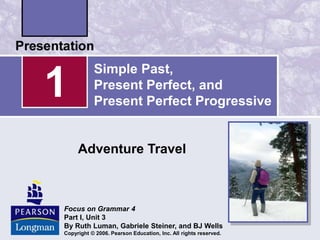
Past simple present perect pp progressive
- 1. Simple Past, Present Perfect, and Present Perfect Progressive Adventure Travel 1 Focus on Grammar 4 Part I, Unit 3 By Ruth Luman, Gabriele Steiner, and BJ Wells Copyright © 2006. Pearson Education, Inc. All rights reserved.
- 2. Adventure Travel Ad Are you looking for a little adventure in your life? Travel with me to beautiful Colorado. I’m an experienced river rafting and rock climbing guide. I’ve been guiding adventure travelers in this area for 10 years. In fact, last year, I took 30 trips down the Colorado River. Oh, and don’t worry about safety. I’ve also taken a number of first aid and safety courses. No one has ever broken any bones on my trips!
- 3. He’s not kayaking now. Use ago to show when something started. Simple Past 1 I kayaked in the Grand Canyon for two months. past now future Use the simple past to talk about things that happened and were completed in the past. kayaked I rafted down the Nile River a year ago. rafted
- 4. Perfect Tenses 1 I have guided travelers my entire career. I have been rock climbing for 10 years. These things continue up to the present and may continue into the future. have guided have been rock climbing past now future Use the present perfect and the present perfect progressive to talk about things that started in the past, but were not completed.
- 5. Remember! Non-action (stative) verbs are not usually used in the progressive. I’ve been knowing how to rock climb since I was young. I’ve known how to rock climb since I was young.
- 6. for six years Perfect Tenses 2 We often use the present perfect and the present perfect progressive with for and since. Use for to show how long something has been true and since to show when something started. I have trained for six years to take this trip. He has been guiding trips since 2000. since 2000 for six years past now future have trained since 2000. has been guiding
- 7. Simple Past 2 Use the simple past with past time expressions. We trekked through the Andes Mountains last year. He backpacked in Peru two months ago. past now future last year. ago.
- 8. Be Careful! Don’t use specific time expressions with the present perfect except after since. She took skydiving lessons last year. She has taken skydiving lessons last year. She has taken skydiving lessons since 2004. last year. last year. since 2004.
- 9. Dear Mom and Dad, I (sit) here for hours looking at the beautiful birds in the rain forest. This vacation to Brazil (be) wonderful! I (see) so many amazing animals since I arrived here. Last week, I (hike) through the forest to see the tree monkeys. Our guide on that trip (tell) us some very interesting information. I (learned) so much on this trip! Love, Daniela Practice 1 Fill in the blanks with the simple past, present perfect, or present perfect progressive forms of the verbs in parentheses. have sat/have been sitting has been have seen hiked told have learned/ have been learning
- 10. Present Perfect 1 Use the present perfect without time expressions to talk about things that happened at some indefinite time in the past. They have canoed down the Amazon River. past now future We don’t know when they canoed down the river, or the time is not important. time ????
- 11. Present Perfect 2 The present perfect without for or since shows that an activity is finished. We often say how many or how many times with this use of the present perfect. He has visited Machu Picchu three times. past now future three times.
- 12. for five hours Present Perfect Progressive The present perfect progressive shows that an activity is unfinished. We often say how long with the present perfect progressive. They have been climbing for five hours. past now future for five hours. have been climbing The activity is not finished. They’re still climbing.
- 13. She traveled to Alaska twice this month. She’s traveled to Alaska twice this month. Present Perfect & Simple Past Use the present perfect or the simple past with unfinished time periods such as today, this week, this month, and this year. Notice the difference in meaning. this month. this month. The month isn’t over, but she probably won’t travel again this month. The month isn’t over. She might travel again.
- 14. 1. a. I have taken many first-aid courses. b. I have been taking many first-aid courses. 2. a. She rafted down the Nile River last week. b. She has rafted down the Nile River. 3. a. We lived in Nepal for two years. b. We have lived in Nepal for two years. c. We have been living in Nepal for two years. Practice 2 Look at the groups of sentences. Discuss the differences in meaning with a partner. Example: a. I have visited Kenya three times this year. b. I visited Kenya three times this year.visited have visited The year isn’t over. The use of the present perfect means that she might return again to Kenya. The year isn’t over, but the use of the simple past means that she probably won’t return to Kenya.
- 15. Copyright © 2006 Pearson Education and its licensors. All rights reserved. References
